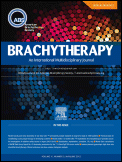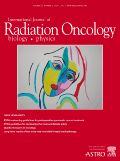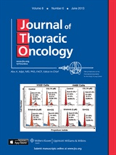
Advances in Radiation Oncology
Scope & Guideline
Shaping the Future of Radiation Oncology Together
Introduction
Aims and Scopes
- Clinical and Dosimetric Studies:
The journal consistently publishes research that evaluates clinical outcomes and dosimetric parameters in various cancer treatments, including comparisons between different radiation therapy techniques (e.g., IMRT, proton therapy) and their impacts on patient health. - Innovative Radiation Therapy Techniques:
There is a strong emphasis on innovative approaches such as stereotactic body radiation therapy (SBRT), image-guided radiation therapy (IGRT), and the use of advanced imaging techniques (e.g., MRI-guided therapy) to enhance treatment precision and efficacy. - Integration of Technology in Radiation Oncology:
The journal explores the integration of new technologies, including artificial intelligence (AI), machine learning, and automated treatment planning systems, to streamline processes and improve treatment delivery. - Multidisciplinary Approaches in Cancer Treatment:
Publications often address the collaboration between various specialties, including the integration of systemic therapies, surgical interventions, and palliative care alongside radiation therapy. - Patient-Centered Care and Quality of Life:
Research focusing on patient-reported outcomes, managing treatment-related toxicities, and improving overall quality of life for patients undergoing radiation therapy is a recurring theme.
Trending and Emerging
- Artificial Intelligence and Machine Learning:
There is a growing body of research focusing on the application of AI and machine learning in radiation oncology, particularly in treatment planning, patient stratification, and predictive modeling of treatment outcomes. - Hypofractionated and Ultra-Hypofractionated Therapies:
An increase in studies exploring hypofractionation and ultra-hypofractionation techniques indicates a shift towards more efficient treatment regimens that aim to reduce treatment time while maintaining efficacy. - Patient Experience and Quality of Life Assessments:
Emerging research increasingly emphasizes the importance of patient-reported outcomes and quality of life assessments, reflecting a trend towards more holistic and patient-centered approaches in cancer care. - Combination Therapies with Immunotherapy:
The integration of radiation therapy with immunotherapy is gaining traction, with numerous studies exploring how these modalities can synergize to improve patient outcomes in various cancer types. - Telemedicine and Remote Care Models:
The rise of telemedicine, particularly accelerated by the COVID-19 pandemic, is a new area of focus, with research aimed at understanding its effectiveness and patient acceptance in the context of radiation oncology.
Declining or Waning
- Traditional Fractionation Schedules:
There appears to be a waning interest in traditional fractionation schedules as the field shifts towards hypofractionation and more personalized treatment regimens that optimize patient outcomes. - Conventional Imaging Techniques:
Research centered around conventional imaging methods is decreasing, likely due to advancements in imaging technologies such as MRI and PET that provide more detailed insights into tumor behavior and treatment response. - General Population Studies:
Studies focusing on broad population-level analyses without specific interventions or targeted assessments are becoming less frequent, as there is a stronger push for precision medicine and individualized treatment approaches. - Basic Research on Radiation Biology:
While foundational research remains important, there has been a notable decline in publications dedicated solely to the basic biology of radiation effects, as more emphasis is placed on clinical applications and outcomes. - Single-Institution Studies:
There seems to be a shift away from single-institution studies towards multi-institutional collaborations that provide broader applicability and generalizability of findings.
Similar Journals

Brachytherapy
Bridging Research and Clinical Practice in Brachytherapy.Brachytherapy, published by ELSEVIER SCIENCE INC, serves as a pivotal journal in the realms of Oncology and Radiology, Nuclear Medicine, and Imaging. With an ISSN of 1538-4721 and an E-ISSN of 1873-1449, the journal disseminates cutting-edge research and advancements from 2002 to 2024, focusing on the innovative field of brachytherapy. Although classified in the Q3 category for Oncology and Q2 for Radiology, Nuclear Medicine, and Imaging based on the 2023 quartile rankings, it continues to make significant contributions to clinical practice and methodology. Brachytherapy holds a respectable position in Scopus, ranking #155/333 and #234/404 in its respective categories, which reflects its importance and relevance to the scientific community. This journal is indispensable for researchers, healthcare professionals, and students looking to stay abreast of the latest techniques and therapeutic approaches in cancer treatment and imaging practices.

Translational Oncology
Transforming Cancer Insights into Clinical SolutionsTranslational Oncology is a premier open access journal published by Elsevier Science Inc, dedicated to the rapidly evolving field of cancer research and oncology. Since its inception in 2008, the journal has been a vital platform for the dissemination of innovative research and findings that bridge the gap between laboratory discoveries and clinical applications. With an impressive impact factor and ranked Q2 in Cancer Research and Q1 in Oncology, it occupies a prominent position in the academic landscape, helping to shape the future of cancer therapeutics and patient care. The journal offers valuable insights across a diverse array of topics, including molecular biology, genetic factors in cancer, and innovative treatment strategies, ensuring relevance and engagement for its readership. As it converges toward 2024, Translational Oncology continues to attract a global audience of researchers, healthcare professionals, and students committed to advancing our understanding of cancer and enhancing clinical outcomes.

Current Breast Cancer Reports
Elevating Research, Transforming Lives.Current Breast Cancer Reports is a vital academic journal published by Springer that focuses on the latest research and advancements in the field of breast cancer. With its ISSN 1943-4588 and E-ISSN 1943-4596, this journal serves as an essential resource for oncologists, researchers, and healthcare professionals dedicated to improving diagnosis and treatment strategies for breast cancer. Spanning from 2009 to 2024, it provides a platform for high-quality, peer-reviewed articles that encompass a range of topics, including molecular biology, clinical trials, and innovative therapeutic approaches. Although it is currently classified in the Q3 category in Oncology and is positioned in the 29th percentile, the journal remains committed to elevating its academic impact and contributing meaningfully to the ongoing fight against breast cancer. As it seeks to disseminate critical findings and foster collaboration within the scientific community, Current Breast Cancer Reports is poised to be an indispensable tool for anyone keen on advancing the field.

Journal of Radiosurgery and SBRT
Bridging Science and Practice in SBRTJournal of Radiosurgery and SBRT is a dedicated platform for advancing the field of radiosurgery and stereotactic body radiation therapy (SBRT), published by OLD CITY PUBLISHING INC. With its ISSN 2156-4639 and E-ISSN 2156-4647, this journal serves researchers and practitioners keen on the latest findings and methodologies in the domains of radiological technology and surgical oncology. Operating from Spain, the journal has established itself within notable quartiles, ranking Q3 in 2023 across categories including Radiological and Ultrasound Technology, Radiology, Nuclear Medicine and Imaging, and Surgery. The journal is indexed in Scopus, with rankings that place it at #311 in Medicine Surgery and #232 in Medicine Radiology categories, reflecting its significance in the academic community. Although it does not currently offer an open-access model, the Journal of Radiosurgery and SBRT aims to foster innovation and collaboration, making it an essential resource for those involved in cutting-edge research and clinical practice in radiosurgery.

ACTA ONCOLOGICA
Exploring the latest breakthroughs in cancer biology.ACTA ONCOLOGICA is a prestigious multidisciplinary journal published by Medical Journal Sweden AB, dedicated to advancing cancer research and clinical practice. As a key resource in the field of oncology, the journal aims to publish high-quality articles that cover significant developments in cancer biology, treatment modalities, and innovative imaging techniques. With an ISSN of 0284-186X and an E-ISSN of 1651-226X, ACTA ONCOLOGICA operates in the United Kingdom and is recognized for its substantial impact, currently holding a Q2 ranking in the categories of Hematology, Medicine (miscellaneous), Oncology, and Radiology, Nuclear Medicine and Imaging in 2023. The journal’s commitment to disseminating pivotal research is reflected in its inclusion in Scopus, with rankings placing it in the top half of its fields. Though it does not currently offer Open Access, it remains an essential resource for researchers, healthcare professionals, and students seeking to stay informed on the latest trends and findings in oncology. Established in 1963, the journal continues to be a cornerstone of cancer research well into 2024.

Physics & Imaging in Radiation Oncology
Elevating Standards in Radiation Therapy with Advanced Imaging SolutionsPhysics & Imaging in Radiation Oncology is a premier journal dedicated to advancing the interdisciplinary field of radiation oncology through innovative research and imaging technologies. Published by Elsevier, this open-access journal has made its mark since its inception in 2017, ensuring that groundbreaking findings are accessible to a broad audience. With a strong focus on the integration of physics, imaging techniques, and oncology, the journal occupies esteemed positions in the academic landscape, ranking in the top quartile for Radiation and Radiology, Nuclear Medicine and Imaging as of 2023. The journal serves as a platform for researchers, professionals, and students to share insights and foster collaboration, ultimately improving patient outcomes through enhanced imaging and treatment modalities. Based in Ireland and operating from Radarweg 29, 1043 NX Amsterdam, Netherlands, the journal aims to bridge the gap between theoretical physics and practical applications in clinical settings.

STRAHLENTHERAPIE UND ONKOLOGIE
Elevating standards in oncology and radiology research.STRAHLENTHERAPIE UND ONKOLOGIE is an esteemed journal published by Springer Heidelberg, focusing on critical advancements and research in the fields of Oncology and Radiology. Established in 1986, this journal has carved its niche within the scientific community, ranking in the Q1 category for Radiology, Nuclear Medicine and Imaging, and Q2 for Oncology as of 2023. With an ISSN of 0179-7158 and E-ISSN 1439-099X, it serves as an essential resource for researchers, professionals, and students dedicated to the complexities of cancer treatment and radiation therapy. While the journal operates under a subscription model, its broad international readership values its rigorous peer-review process and comprehensive coverage of pivotal studies. STRAHLENTHERAPIE UND ONKOLOGIE continues to enhance its impact in the domains of oncology and radiology, as evidenced by its commendable Scopus rankings, including a 76th percentile in Radiology and a 65th percentile in Oncology. Its commitment to disseminating innovative research solidifies its role as a cornerstone in the ongoing quest to improve patient care and therapeutic techniques.

INTERNATIONAL JOURNAL OF RADIATION ONCOLOGY BIOLOGY PHYSICS
Exploring the Nexus of Radiation, Biology, and Oncology.International Journal of Radiation Oncology Biology Physics, published by Elsevier Science Inc, is a premier academic journal that has played a critical role in advancing the field of radiation oncology since its inception in 1975. With an impressive impact factor and recognition as a Q1 journal across multiple categories such as Cancer Research, Oncology, and Radiology, this journal serves as a vital resource for researchers, clinicians, and students dedicated to understanding and improving cancer treatment modalities. Its multifaceted scope encompasses original research, reviews, and innovative clinical studies, fostering a deeper understanding of the interplay between radiation, biology, and oncology. With a remarkable ranking in Scopus, including a top position in Radiation Physics and an elite percentile in Oncology, IJROBP remains at the forefront of scientific discovery and innovation in the management of cancer. A traditional subscription model ensures high-quality, peer-reviewed content, providing invaluable insights that continue to advance the standards of care and research in radiation oncology.

Journal of Thoracic Oncology
Shaping the Future of Thoracic Oncology TogetherJournal of Thoracic Oncology, published by Elsevier Science Inc, is a premier scholarly outlet dedicated to advancing the field of thoracic oncology. With an impressive impact factor and consistently rated in the Q1 quartile across several pertinent categories such as Medicine, Oncology, and Pulmonary and Respiratory Medicine, this journal stands at the forefront of research dissemination. Covering a broad scope that includes innovative therapeutic approaches, clinical trials, and the molecular underpinnings of thoracic malignancies, the journal serves as a vital resource for researchers, healthcare professionals, and students seeking to enhance their understanding of thoracic cancer and its treatment. With publication dates converging from 2006 to 2024, the Journal of Thoracic Oncology fosters a collaborative scholarly community by providing a platform for high-quality research while ensuring accessibility through traditional publication formats. Positioned in the heart of New York City, this journal not only reflects the cutting-edge advancements in oncology but also plays a pivotal role in shaping the future of thoracic cancer care.

International Journal of Particle Therapy
Innovating Radiation Therapy for a Healthier TomorrowInternational Journal of Particle Therapy, an esteemed publication from the INT JOURNAL PARTICLE THERAPY, stands at the forefront of innovative research in the realms of particle therapy, radiology, and atomic physics. Established as an Open Access journal since 2015, it provides a platform for scholarly articles that drive the advancement of knowledge and practice in cancer treatment and radiation therapy. With an impact factor reflective of its rising stature, this journal has been categorized in the Q2 quartile for both Atomic and Molecular Physics and Radiology, Nuclear Medicine and Imaging as of 2023, illustrating its significant role in contributing to these vital fields. Researchers, professionals, and students alike will find the journal indispensable for accessing pioneering studies that explore the efficacy and application of particle therapy, ensuring that the latest advancements reach a broad audience. With a robust focus on bridging theoretical insights and clinical practices, the International Journal of Particle Therapy remains committed to enhancing patient outcomes and fostering collaboration among scientists worldwide.